Food Studies News
Faculty of the Year Awards
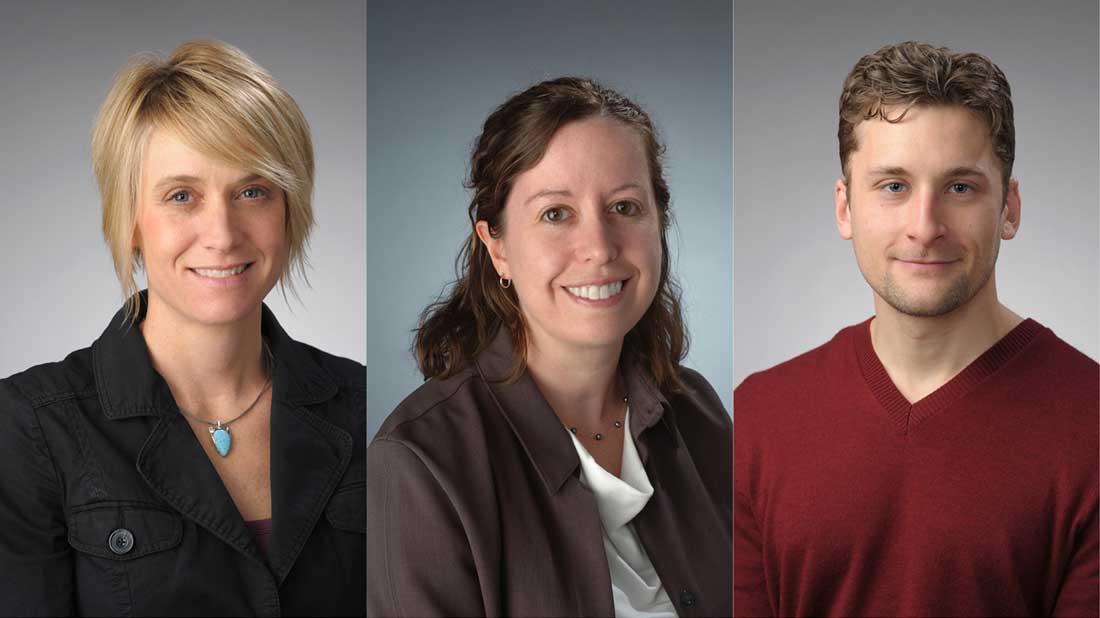
Jane Burrell, Lynn Brann, and Bryce Hruska were honored with 2023 Falk College Faculty of the Year awards for excellence in teaching, service, and research, respectively. The honorees were nominated by their peers for outstanding teaching, scholarship, and internal and professional service contributions and announced by the Falk Faculty Council in early May.
Chaya Lee Charles, an assistant teaching professor in the Department of Nutrition and Food Studies and chair of the Falk Faculty Council, thanked all faculty members who submitted nominations and her fellow Faculty Council members for their time and efforts in the award selection process.
“It is inspiring to see the talent and excellence that we represent as a college, and the high caliber of the nominees made our job challenging,” Charles says. “The Faculty Council is excited to share the results of our thoughtful deliberations.”
Here’s a look at the 2023 honorees with comments from their award presenters:
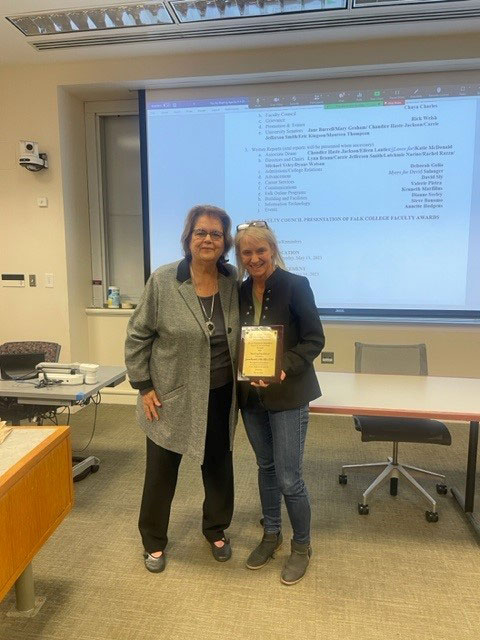
Jane Burrell
Associate Teaching Professor in the Department of Nutrition and Food Studies
Evan Weissman Memorial Faculty of the Year Award for Teaching Excellence
From presenter Lisa Olson-Gugerty, associate teaching professor in the Department of Public Health:
“Jane has taught and continues to teach multiple courses in her department, and her teaching prowess was described as dynamic and responsive to her students’ needs. Her ability to teach with such excellence stems from her lengthy past and current clinical work in nutrition and dietetics. In other words, she is teaching from ‘hands-on’ experience.
“Jane has mastered adaptability in the classroom. She teaches introductory nutrition (NSD 225) in multiple modes, modifying delivery and assessment to match her audience. In the fall, Jane teaches a large section of NSD 225 for students from across campus. Given the size and limited support (10 teaching assistant hours per week), managing NSD 225 requires organization and attention to detail. Jane keeps the class current by modifying content, utilizing new textbooks, and adopting technology to engage a large audience.
“Jane is dedicated to professional development. In 2022, she participated in a Peer Teaching Evaluation Workshop focused on ‘Small Teaching,’ a book James Lang. She utilized this new knowledge in her ‘NSD 342: Nutrition in the Lifespan’ course. She initiated low-stakes quizzes, providing immediate feedback and a sense of where students stood in the learning process. Jane further modified NSD 342 after attending the Equity-Minded Syllabus Design Workshop by the Center for Teaching and Learning Excellence. This training prompted her to add detail concerning the weight and purpose of assignments so students would understand what they gain from assessments while increasing motivation.
“Jane is not afraid of challenges. In spring 2022 she taught a two-week immersion travel course in Italy, ‘NSD 452: Mediterranean Food and Culture,’ for the first time. The course was started by a recently retired colleague. When the opportunity arose, Jane jumped at the chance to teach the class, working with Syracuse Abroad to create new student experiences. Jane is excited about modifications for this spring that further enhance the abroad experience.
“Jane strives to provide her students with the most recent evidence-based education. In fact, she is currently enrolled in a Ph.D. program in our very own Human Development and Family Science department. Her list of teaching skills and accomplishments goes beyond what is listed here. On a personal note, I want to add that I am thrilled to be presenting this award to Jane. She was one of the first people I met when I joined Falk and has always been a kind and supportive colleague.”
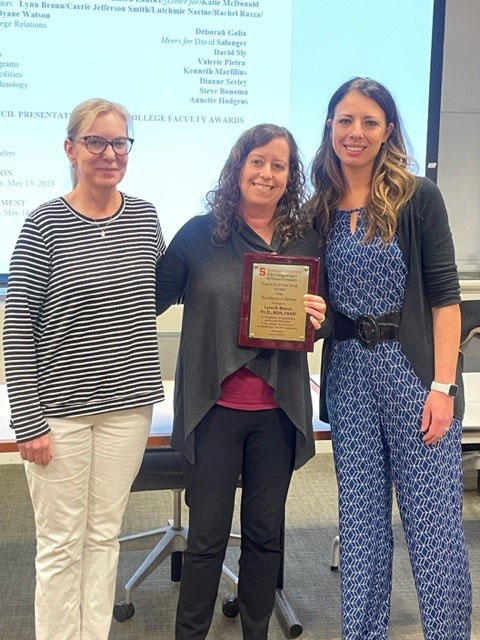
Lynn Brann
Chair of the departments of Exercise Science and Nutrition and Food Studies, associate professor in the Department of Nutrition and Food Studies
Faculty of the Year Award for Excellence in Service
From presenter Chaya Lee Charles, assistant teaching professor in the Department of Nutrition and Food Studies:
“Lynn has an extensive resume of teaching, research, and service in Falk College and within the University as evidenced by her previous receipt of nine Chancellor’s Awards for public service during her tenure at Syracuse University.
“This academic year, however, she went far above and beyond, accepting her call to duty by chairing not only the combined Department of Nutrition and Food Studies, but also chairing the Department of Exercise Science. Despite this challenging task, Lynn has provided leadership, support, guidance, and advocacy for both departments while mentoring junior faculty in the Nutrition program and assisting Exercise Science faculty and staff through the growing pains of acclimating to Falk College. She has exceeded all expectations one could place on someone assigned such a difficult role and has done so with grace, compassion, understanding, and outstanding professionalism.
“In additional service during 2022 at the University level, Lynn was selected to participate in the inaugural Syracuse University Women in Leadership Cohort Group to support the professional development and career development of women faculty and staff at the University. She also continued her work on the Academic Appeals Committee; the Falk College Promotion and Tenure Committee; the Falk College Diversity, Equity, and Inclusion Committee, and the Falk College Program Review Committee, and she is a Dean’s Cabinet member and serves as a trainer for Academic Integrity panelists and Academic Integrity faculty interviewers.
“Locally, Lynn serves on the Health Services Advisory Board, Peace, Inc., Head Start, and Early Head Start of Syracuse. In her desire to further the profession of nutrition and dietetics, Lynn also serves as advisor to the Pediatric Nutrition Practice Group of the Academy of Nutrition and Dietetics and is a journal reviewer for the Journal of Child and Family Studies, Appetite, Nutrients, the International Journal of Obesity, the Journal of the Academy of Nutrition and Dietetics, the Journal of Nutrition Education and Behavior, Public Health Nutrition, the Journal of the American Medical Association Pediatrics, the Maternal and Child Health Journal, and the Maternal and Child Nutrition Journal.
“I couldn’t be more pleased to honor Lynn with this award as she has been a calming force to our department and a strong leader who consistently considers all aspects of any difficult situation and guides us in the right direction. No matter the problem, she always has an open door and provides sound counsel, such as my favorite piece of wisdom, that ‘It will all be fine!’”
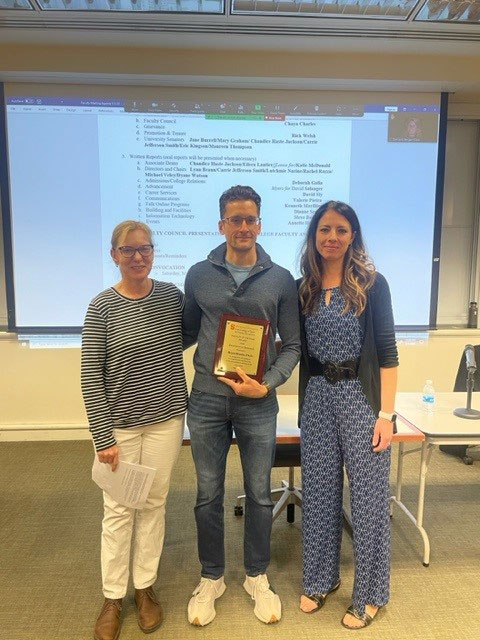
Bryce Hruska
Assistant Professor in the Department of Public Health
Faculty of the Year Award for Excellence in Research
From presenter Lisa Olson-Gugerty, associate teaching professor in the Department of Public Health:
“Over the last several years, Bryce has been systematically building his program of research, investigating post-traumatic stress disorder (PTSD) and its co-occurring mental health consequences, and identifying strategies for addressing PTSD before it takes its full toll on functioning.
“In the past year, he has had several notable accomplishments that have significantly advanced his research program. He submitted six first-authored, peer-reviewed pieces of scholarship resulting in two published peer-reviewed articles, one peer-reviewed article in press, one published peer-reviewed book chapter, and two peer-reviewed articles that are currently under review after receiving an invitation to revise and resubmit. The published/in press pieces all appear in high impact journals, including Sleep Health, Journal of Psychiatric Research, and Journal of Anxiety Disorders.
“Bryce has presented his research and its findings at two international conferences: the International Society for Traumatic Stress Studies and Society for Ambulatory Assessment. These presentations included a peer-reviewed symposium and two peer-reviewed poster presentations.
“Much of his research focuses on the mental health burden experienced by healthcare providers, a topic that has recently received special attention due to the COVID-19 pandemic. To facilitate the translation of his research into practice, this past year he delivered an invited presentation at American Medical Response (the largest ambulance service provider in Central New York) that described his research examining the connection between sleep and mental health. He also wrote two pieces of publicly engaged scholarship–including a blog post and a research brief–that were delivered to an international audience of policy makers, practitioners, media outlets, students, and the public.
“Finally, he was awarded a CUSE Innovative and Interdisciplinary Research Grant supporting the next phase of an intervention that he is developing that will reduce the mental health symptoms experienced by ambulance service providers. This work will serve as pilot data for a subsequent submission for extramural funding from the National Institute of Occupational Safety and Health.
“Collectively, these achievements highlight his commitment to high-quality research that has translational implications and demonstrate the high level of research activity that he has engaged in during the past year. I would like to personally add that as a healthcare worker in emergency medicine who has spent a significant amount of time working in the COVID pandemic, I appreciate all that Bryce has done and continues to do in his research for me and my colleagues.”
Class of 2023 Food Studies Awards
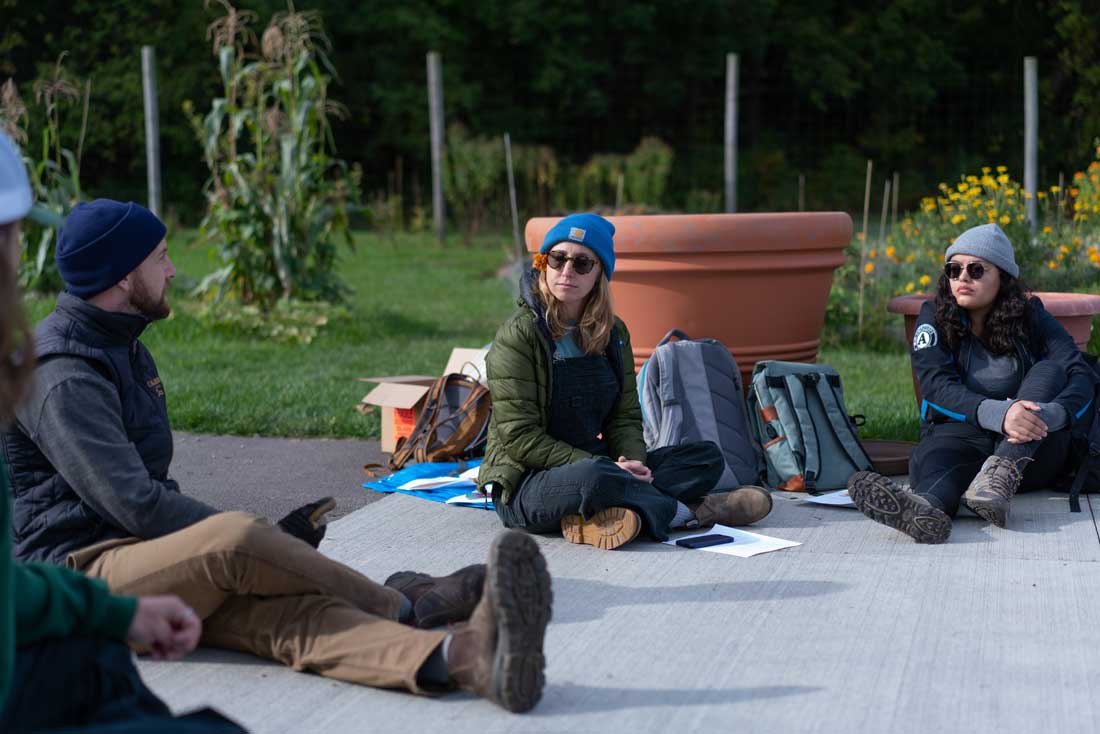
The Falk College Food Studies program would like to congratulate its Class of 2023 award winners! Here’s a list of the winners, a description of the award, and comments about the awardees from Food Studies faculty:
Chef’s Prize – Emory Sammons
Awarded to a Food Studies graduate who demonstrates exceptional ability in the culinary arts. This ability includes attaining food justice and community engagement goals of the Food Studies Program. From Undergraduate Director and Associate Teaching Professor Mary Kiernan:
“Emory decided to take the most rigorous kitchen course, Food Service Operations, his senior semester. He came to the course with enthusiasm and the will to engage that set the bar for the rest of the group. Emory also quickly connected the course content to his practicum experience at Drumlin’s. He takes the classroom learning to work and brings the work experiences to the classroom. He is a model for experiential learning.”
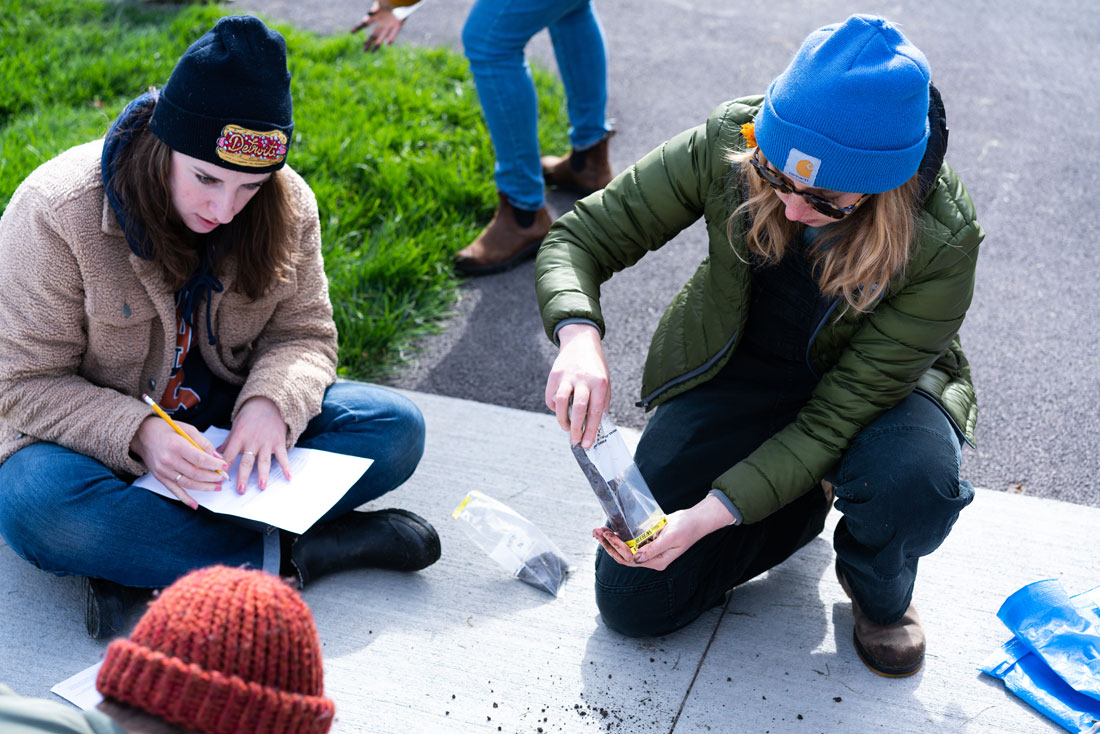
Food Justice Award – Dea Closson
Awarded to a Food Studies graduate who demonstrates the ability to successfully address food justice related issues through a variety of mediums. From Falk Family Endowed Professor Rick Welsh:
“Dea’s practicum at the Brady Market is a testament to using her work experience and talents to promote food justice solutions to seemingly intractable issues of food injustice in the City of Syracuse. Along with her work at Brady Market, Dea has been generous with her time sharing her experience with Food Studies undergraduates, teaching them what an alternative food system can be. Dea also has been a valuable addition to my research on establishing haying and grazing policies for Conservation Reserve Program lands to protect ground bird nesting sites.”
Community Engagement – Mackenzie Ker
Awarded to a Food Studies major or minor who demonstrates the ability to create or implement progressive food-based initiatives that engage diverse politics locally, nationally, or internationally. From Falk Family Endowed Professor Rick Welsh:
“Mackenzie is interested strongly in understanding sustainability within the food service and tourism industry. She is currently assisting in the reorganization and updating of a Food Studies undergraduate class on Sustainable Food Enterprise Management.”
Culture and Commensality Award – Gabriel Hanson Smith
Awarded to the Food Studies major who has expanded the Food Studies program to new audiences by sharing food knowledge and practice through social activism. From Assistant Professor Estelí Jiménez-Soto:
“Gabe has been an integral part of the campus garden for the past couple of years. During his short time as garden coordinator, he has facilitated activities that open the garden space for the broader campus community, including bringing FST classes to the garden and offering volunteering opportunities to interested members of our campus. This allows Pete’s Giving Garden to be a place where students can share their knowledge on agriculture and food identities and learn how to grow food.
Research Award – Michelle Tynan
Awarded to a Food Studies major who produces a research project and paper of exceptional quality. The paper should address substantial issues regarding the sustainability of the food system, including food justice, human rights or ecological, economic, and social impacts of food production, consumption, processing, and distribution. From Falk Family Endowed Professor Rick Welsh:
“Michelle’s indefatigable approach to qualitative data collection, analysis and presentation is inspiring. She has proven an invaluable contributor to my research on understanding the potential value of algae feed supplements to enhancing dairy herd health, productivity, and reducing methane emissions to combat global warming. Her previous experience working in the dairy industry and the Washington State Department of Agriculture have also enhanced her research contributions.”
Graduate School Master’s Prize – April Lopez
Awarded to a master’s student in each of Syracuse University’s 11 schools and colleges who has demonstrated excellence in scholarship and research in graduate study. From Graduate Director and Associate Professor Laura-Anne Minkoff-Zern:
“April applied to the graduate program to enhance her critical understanding of labor injustice in the food system and desire to find a professional path to supporting low-wage food workers and their voices in social movement activism. In addition to conducting independent research, she has also engaged in community advocacy and organizing work for farmworker justice, worked as a teaching assistant and research assistant, and developed course curriculum. In her master’s thesis, April focused on food insecurity on college campuses and the related struggles of student workers. Looking closely at the intersection of race and class and how it is experienced by students in terms of campus employment and economic precarity, April’s work makes an important intervention into the growing body of literature on campus food insecurity.”
Evan Weissman Scholarship – Marguerite Leek
This scholarship is awarded to a graduate student in Food Studies who demonstrates a commitment to food justice and uses food as tool for social change. From Professor Anne C. Bellows:
“Marguerite Anna Leek hails from western North Carolina, where she and her family regularly volunteered at the local food bank. To reflect critically on the role of food banks in an economically polarized society, she conducted pilot interviews with staff at food banks in New York, Texas, North Carolina, and Washington state to gauge their understanding of rights-based versus charity approaches to economic inequality and insecurity. Her work was picked up by the U.S. Right to Food Community of Practice and has been requested for inclusion in a special issue of the University of Miami Law Review Journal.”
Interested in a career working with food and agriculture issues, sustainability and food security, or food processing, preparation, and distribution? Learn more about its academic programs, experiential learning, and career opportunities.
Syracuse University’s Highest Honor
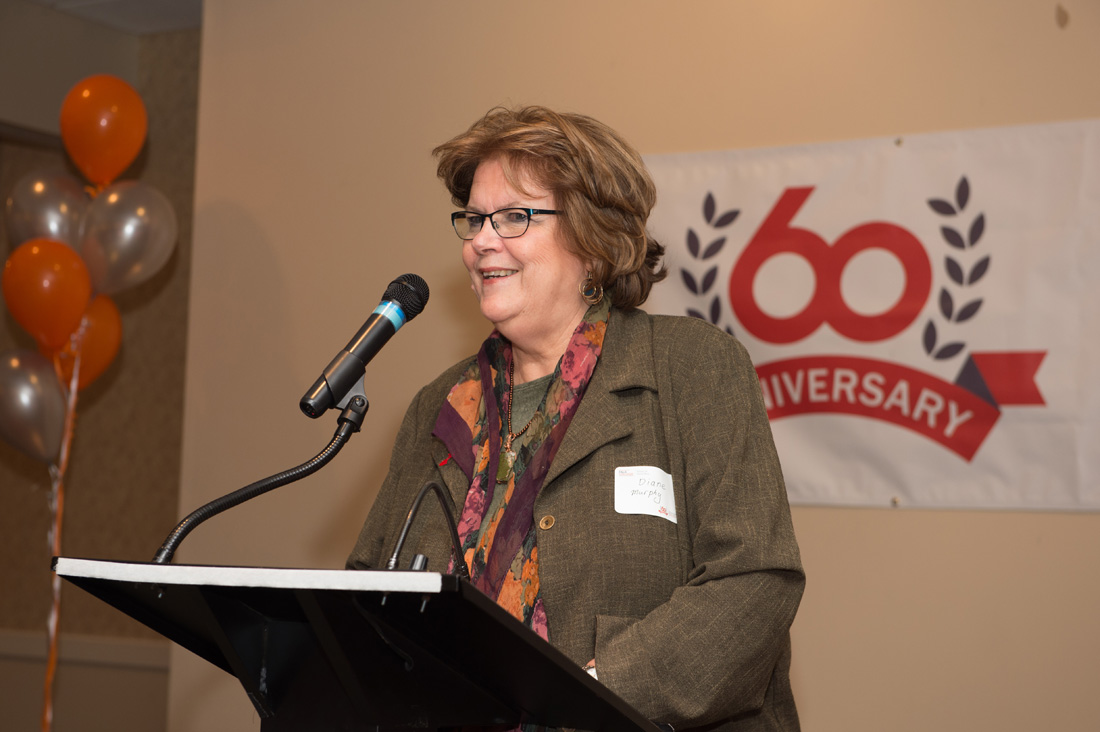
Diane Lyden Murphy, dean of the Falk College of Sport and Human Dynamics, received Syracuse University’s highest honor–the Chancellor’s Medal–at the One University Awards Ceremony April 21 at Hendricks Chapel.
The Chancellor’s Medal is awarded to individuals in honor of their trailblazing and extraordinary contributions to the University, to an academic body of knowledge, or to society. Dean Murphy, who was appointed Dean of the College of Human Services and Health Professions (now Falk) in May 2005, checks all three boxes.
“This medal is given for the very things Diane has always done here: extraordinary contributions to the University, to the community, to academic knowledge,” Chancellor Kent Syverud said before presenting the Chancellor’s Medal to Dean Murphy. “She’s done those things, but she’s also done one thing that’s even rarer and worth celebrating and I can say this from experience, she has consistently and faithfully had the courage to speak up.
“She’s had the courage to speak up, including to chancellors, when things are not right, when they could be better, and even more rare is that after speaking up she has the integrity to roll up her sleeves and actually work to make them better,” Chancellor Syverud added.
Dean Murphy was one of several 2022-23 award recipients who were honored at the April 21 ceremony. Watch the video of the Chancellor’s Medal presentation here:
Dean Murphy received four degrees at the University and joined the faculty in the School of Social Work in 1978. Prior to her appointment at Falk, Dean Murphy served 17 years as director of the Women’s Studies program in the College of Arts and Sciences.
Dean Murphy’s many contributions to the University include co-authoring the University’s sexual harassment policy; initiating studies of gender pay equity; developing adoption and domestic partner benefits; and creating a family-friendly environment for students, faculty, and staff.
Chancellor Syverud started his remarks by reading a news release from January 1973 about Dean Murphy’s appointment as a personnel intern in the Office of Student Affairs who would “specialize in the problem of married students.” She served as a liaison between married students and the administration and from that work arose the first childcare center on campus.
“There have been a lot of initiatives in the last 50 years at Syracuse University to help people and populations in our community,” Chancellor Syverud said. “There have been precious few where Diane Lyden Murphy has not been present and accounted for in support of doing the hard work and listening and doing the problem-solving and speaking up to make things better.
“We talk about diversity, equity, inclusion, accessibility, and support for survivors, Diane was there often before most of the world had developed the vocabulary to describe the problem and the opportunity,” Chancellor Syverud added. “Going back to that first press release, Diane never regarded married students as a problem, she never regarded these things as problems, she regarded them as opportunities. And boy, she’s made an impact on this University! I can’t imagine what this place would be like today without her work, but I’m certain it would be a less accomplished and a colder and less just and less human place.”
The Chancellor’s Medal is the latest in an extensive list of awards Dean Murphy has received while at the University, including the Excellence in Graduate Education Award from the Graduate School, the Francis McMillan Parks Women of Influence Award, and a Chancellor’s Citation. In 2005, the Women’s Studies Program established the Diane Lyden Murphy Women’s Studies Activism Award in her honor.
Honoring Tradition
The planting and dedication were the culmination of the graduate practicum of Ethan Tyo ’17, G’23, a master’s degree student in food studies in Falk College. In addition to providing fresh food for the University’s food pantries in Hendricks Chapel and on South Campus, Pete’s Giving Garden supports new ways of teaching and learning.
Tyo recognized an opportunity to grow food not only in a sustainable manner, but in a way that honors the traditions and culture of the Onondaga Nation, firekeepers of the Haudenosaunee, the Indigenous people on whose ancestral lands Syracuse University now stands. “The ‘three sisters’–corn, beans and squash—are foundational foods that gave rise to the strength and resilience of the Haudenosaunee people. Thousands of years of traditional ecological knowledge and expertise have cultivated our relationship to the land and our survival,” says Tyo. “Returning these seeds to our ancestral lands is a step towards acknowledging that relationship and the contributions that Indigenous peoples have made throughout history.”
The dedication focused on the May planting moon and created what is known as a traditional “Three Sisters garden,” which will incorporate the traditional seeds and methods of the Onondaga Nation using the knowledge and wisdom of the Onondaga Nation Seed Keepers. The event included a presentation on seed sovereignty, revitalizing Indigenous foods and the impact that climate change has on Haudenosaunee ways of being. It also acknowledged the return of traditional seeds to the ancestral land of the Onondaga Nation, giving Haudenosaunee students the chance to learn and practice cultural revitalization while in an academic setting.
This event was a collaboration between the Onondaga Nation Seed Keepers, Hendricks Chapel, Energy Systems and Sustainability Management, the Office of Multicultural Affairs, the Native Student Program, the Falk College Department of Nutrition and Food Studies and the Office of Diversity and Inclusion.
Continuing the Legacy
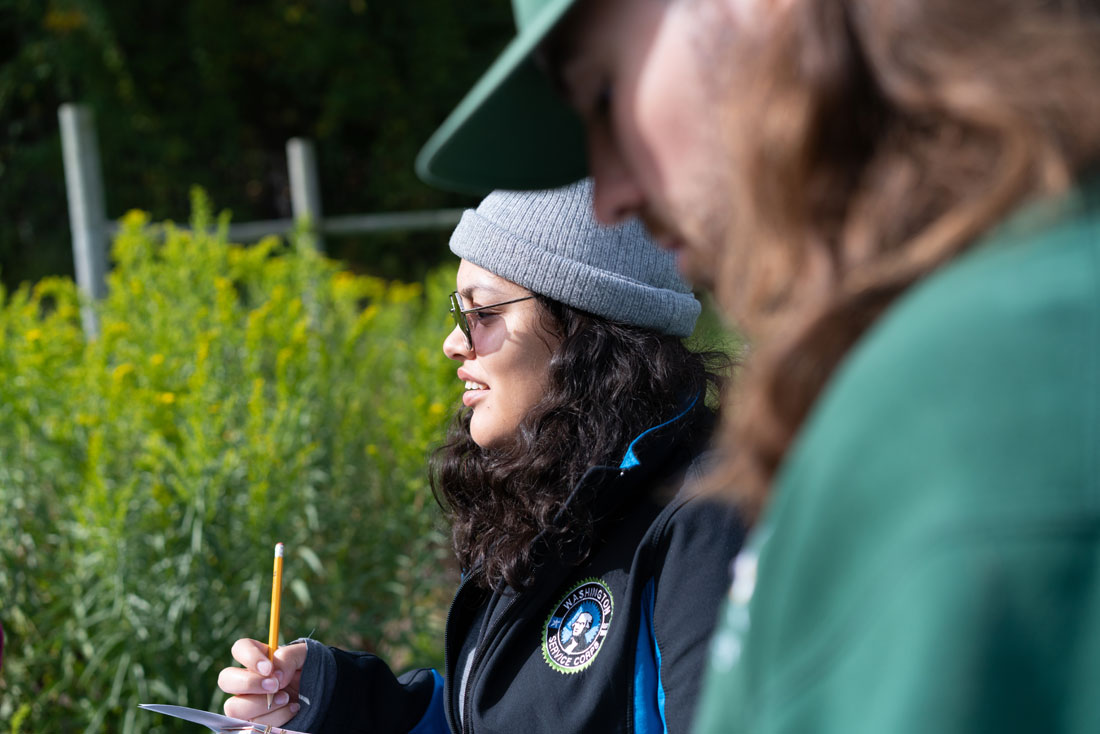
April Lopez says she was drawn to Syracuse University’s Food Studies master’s program because of its vision of food justice.
That vision was shaped in large part by Syracuse Professor Evan Weissman, a tireless advocate for equity in the food system whose work provided the foundation for grassroots food justice initiatives throughout the country.
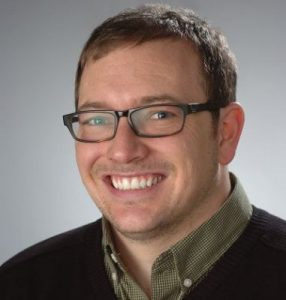
Weissman died unexpectedly in April 2020, and his family created the Evan Weissman Scholarship Fund to honor his legacy. Lopez was the 2022-23 recipient of the award, and she is continuing the work that Weissman believed in so deeply.
“For my master’s thesis, I’m focusing on college food security at my alma mater and former service placement, Gonzaga University,” Lopez says. “I plan to address the identities most impacted by food insecurity and the barriers that limit food access for students to determine interventions that support students and their overall success.”
To learn more about Lopez, we asked about her background, career aspirations, and connection to Weissman. Here’s that conversation:
Q: Can you tell us about your life before Syracuse University?
A: I’m originally from Washington state, a daughter of farmworkers, a former fruit packer, and an undergraduate student from Gonzaga University, where I studied marketing and communication studies.
Unsure of what to do after graduation, I decided to pursue a year of service through Washington Service Corps, a state branch of AmeriCorps at Gonzaga University (it happened to coincide with the start of the pandemic). In this role, I recovered leftover food from campus dining and repurposed it for meal programs throughout northeast Spokane, Washington. At the height of the pandemic, I was placed on alternative service at a food bank distribution center called Second Harvest, where I was responsible for community food distributions throughout the inland northwest.
After three months, I returned to Gonzaga to resume my responsibilities and adapt to the changes brought on by COVID-19. Moved by the efforts to mitigate food insecurity, I pursued a second year of service in which I continued the responsibilities of repurposing meals and led school food and snack distributions for our partner schools.
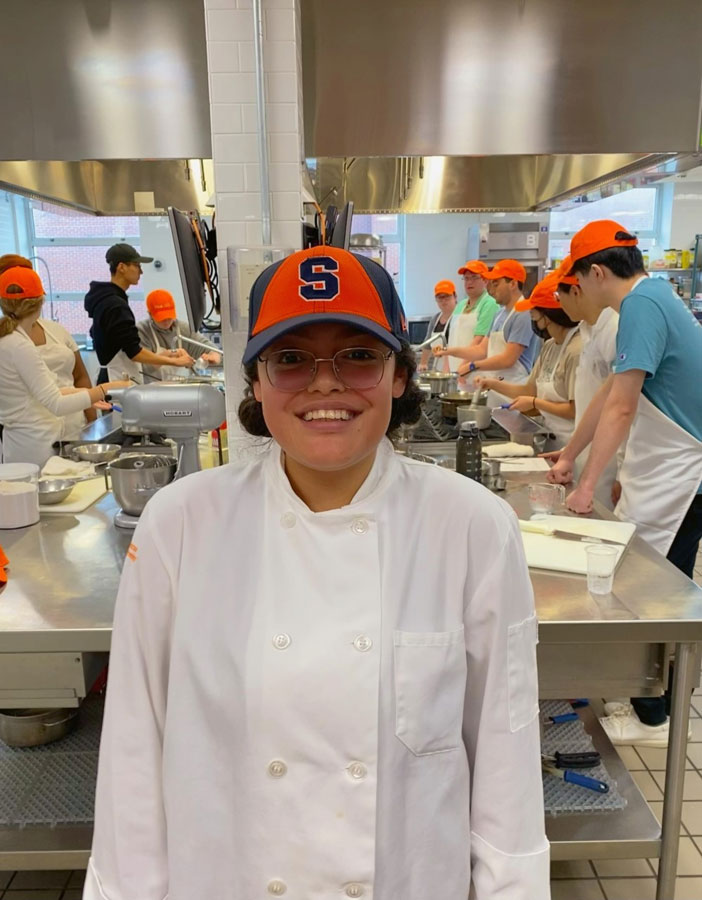
Q: Why did you choose Syracuse for your master’s?
A: My life and academic interests were far more intertwined than I was aware of, having faced food insecurity and labor injustices as a fruit packer, and eventually dedicating two years of service to food security efforts. This all culminated in pursuing a master’s in food studies, and I decided to apply only to Syracuse University’s Food Studies master’s program because I was drawn to the program’s vision of food justice that aligned with my own values of food justice.
Q: What are your academic interests and aspirations?
A: I am particularly interested in research involving college food security and farmworker labor rights, both of which are topics that resonate with me personally given my background in agricultural work and my own experiences as a food insecure college student.
Q: What would like to say to the family of your scholarship sponsor, the late Evan Weissman?
A: I am very grateful and honored to receive this scholarship. I had many fears coming into graduate school, primarily the financial vulnerability of being a low-income student.
While I have had the great privilege of being a graduate assistant for two of his former courses, I unfortunately was unable to meet Evan. But learning more about what he did and left behind has inspired me to continue his legacy of food justice. I have felt touched by his work and the legacy he has left behind. In all that I have had the privilege in doing, he has been there.
Interested in a career in food justice? Visit the Food Studies homepage to learn more about its academic programs, experiential learning, and career opportunities.
Those who would like to make a gift to the Evan Weissman Scholarship Fund can make a secure gift online. To make a gift by check, please make it out to Syracuse University and mail to Falk College Advancement, 427 White Hall, Syracuse, NY 13244. If you have any questions, please contact David Salanger, Assistant Dean for Advancement and External Relations, at 315.443.4588 or dasalang@syr.edu, or Megan Myers, Director of Development, at 315.443.1817 or mmyers01@syr.edu.
Sports Nutrition Expert Heidi Skolnik to Speak
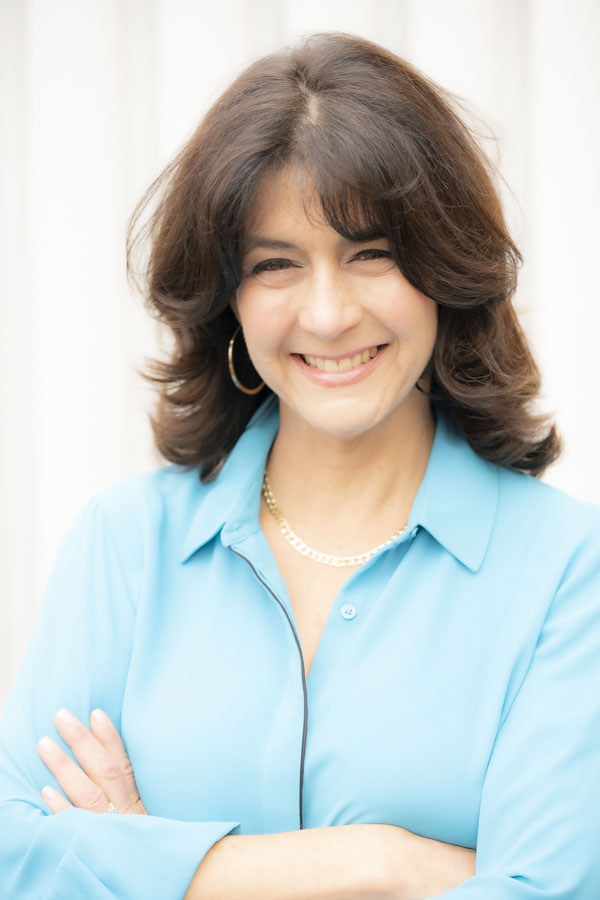
We invite you to join us at 6:30 p.m. April 20 in Grant Auditorium, Falk Complex, for her lecture “Cancel Diet Culture: Food, mood, body image and media. Learn how to normalize vs. moralize eating.” The event is free and open to the public. Light refreshments will be served at 5:30 p.m. prior to the lecture.
A national thought leader in nutrition, Skolnik has influenced millions through her media work, writing, and thriving consulting business. She oversees the Performance Nutrition program at The Juilliard School and the School of American Ballet and she has consulted with numerous Broadway shows, including “Hamilton,” “An American in Paris,” “Aladdin,” and “Billy Elliot.” Previously, she worked with the NBA’s New York Knicks (seven years), NFL’s New York Giants Football (18 years), and Major League Baseball’s New York Mets (15 years), and with NHL, MLS, WNBA, Olympic, collegiate, high school, and recreational athletes.
Skolnik has been part of The Women’s Sports Medicine Center at the Hospital for Special Surgery for over 20 years. She has co-authored five books, including The New York Times best-selling “The Whole Body Reset,” “Nutrient Timing for Peak Performance: The right food, the right time, the right results,” and “The Athlete Triad Playbook.”
“When you combine Heidi’s extensive experience with athletes from high school to the NFL with her ability to connect with audiences, this is a can’t-miss opportunity for anyone interested in performance nutrition,” says Lynn Brann, chair of the departments of Nutrition and Food Studies and Exercise Science at Falk. “We are thrilled that Heidi will share her stories and insights with us, and we are grateful to the Litt family for their continued support of this event that greatly benefits our students.”
An experienced and sought-after presenter, Skolnik consults and presents nationwide to corporations, professional organizations, universities, and colleges. As an expert resource for national media, Skolnik has appeared on The Today Show, The View, Good Morning America, The Early Show, The Meredith Vieira Show, Primetime, 20/20, Extra, The Weather Channel, Fox News Channel, ESPN, the YES Network, Food Network, and CNN’s American Morning and Headline News.
In addition to sports nutrition, wellness, and active aging, treating the Female Athlete Triad and Relative Energy in Sports (RED-S) continues to be Skolnik’s area of expertise as she works in collaboration with other members of a client’s team to help each athlete return to health and peak performance.
Skolnik holds two master’s degrees in exercise physiology and human nutrition and is a Fellow with the American College of Sports Medicine. Skolnik sat on the board of the National Osteoporosis Foundation for 10 years and currently sits on the Medical Advisory Committee of the National Menopause Foundation.
For information about the Ann Litt Lecture and accommodations or parking requests, please contact Annette Hodgens at ahodgens@syr.edu or 315.443.9816.
About the Ann Selkowitz Litt Distinguished Speaker Series
Ann Selkowitz Litt ’75 (1953-2007) was a nationally known nutritionist who helped children and adolescents with eating disorders and assisted developing athletes in reaching their full potential. The nutrition consultant to CosmoGirl magazine, Litt was the author of The College Students’ Guide to Eating Well on Campus, Fuel for Young Athletes, and the American Dietetic Association Guide to Private Practice. She was the nutritionist for the NFL’s Washington Commanders and served as spokesperson for several media campaigns during her career, including the Got Milk campaign. After her death, the Ann S. Litt Foundation, Inc., was created to support nutrition education. Through a generous gift from this foundation to Falk College, the Ann Selkowitz Litt Distinguished Speaker Series was created at Syracuse University in 2015.
Savoring College Life
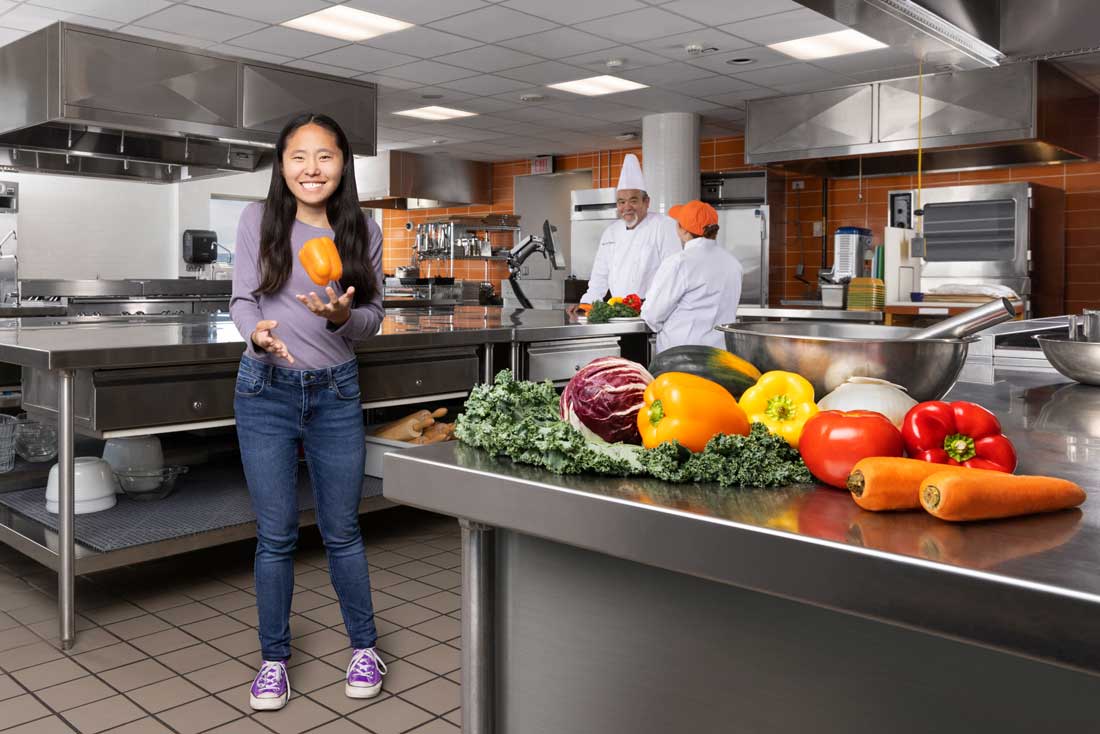
It’s a blustery day in late November and Mackenzie Gleason ’24 makes sure she has a recipe safely tucked away in a pocket as she walks across campus to Syracuse University’s Falk College. She’s headed to the Susan R. Klenk Learning Café and Kitchens and is looking forward to baking a batch of maple-glazed apple crisp cookies. “Tonight is self-cook night because it’s so close to Thanksgiving,” she says of the cooking lab for Farm to Fork, a course she’s taking. “These only take 28 minutes total, so that’s not too bad.”
Gleason is a food studies major and sports the credentials of a foodie, for sure. In conversation, she talks about her food studies classes, cooking, favorite dishes, a friend’s peanut allergy and the exotic flavors of a Japanese soda with a marble in the bottle to preserve carbonation. She also speaks about being a fan of celebrity chef Guy Fieri’s Food Network shows and several local restaurants, including ones Fieri has visited. “I love cooking,” she says.
For Gleason, the opportunity to pursue her passion is important, and she’s doing it through InclusiveU, an initiative of the School of Education’s Lawrence B. Taishoff Center for Inclusive Higher Education that welcomes students with intellectual and developmental disabilities to experience college life in a fully inclusive setting. Gleason, who identifies as autistic, is a commuter student who hopes to live on campus next year.
Working toward a certificate in food studies, Gleason also took the course Nutrition in Health in the fall semester. In addition, she is gaining valuable experience working at a Wegman’s grocery store where she does food prep and packaging. Along with those responsibilities, she’s attentive to customer questions and providing support. “I can help with orders, depending on what they are,” she says. “I’m trained on the deep fryer, and I can do egg rolls.”
Mary Kiernan, associate teaching professor in the Department of Nutrition and Food Studies, enjoyed having Gleason in her Farm to Fork course. “Mackenzie has been a treat to have in the kitchens,” Kiernan says. “She is a super student—always prepared before, during and after class. She has worked well in any group she has been assigned. She not only learns from group mates but also teaches them. She understands how to communicate with both peers and instructors. Her enthusiasm for life—and culinary—is contagious!”
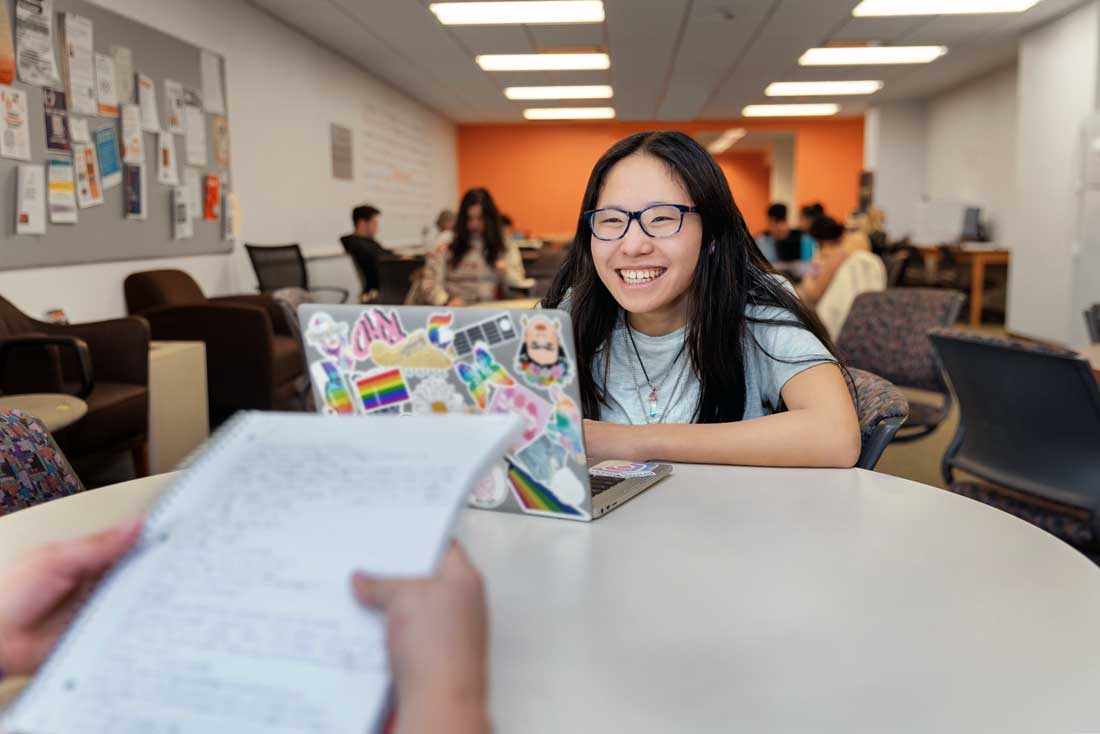
Discovering a Path to College
When Gleason first learned about InclusiveU from her mom, she was excited because she wanted to be a college student. With a longtime affinity for Syracuse University, she likes that it’s close to her home in Phoenix, New York, and notes that her dad went to SUNY College of Environmental Science and Forestry. “I love it at Syracuse University,” she says. “It’s fun. It’s a big campus, and there’s a lot of stuff to do.”
Gleason has made friends on campus and enjoys a range of activities. She is an Orange sports fan who has attended football and soccer games and followed the men’s soccer team on its run to the national title. She is involved in LGBTQ+ student organizations and is also a paid peer trainer for InclusiveU’s Peer2Peer program, which pairs students together for social activities. In the fall, she helped lead classmates on outings to Paint Night at Dave & Buster’s restaurant and a showing of Black Panther: Wakanda Forever. “I basically meet people here and take them to events,” she says. “I make sure they have tickets, bring what they need and make sure they know how to get back.”
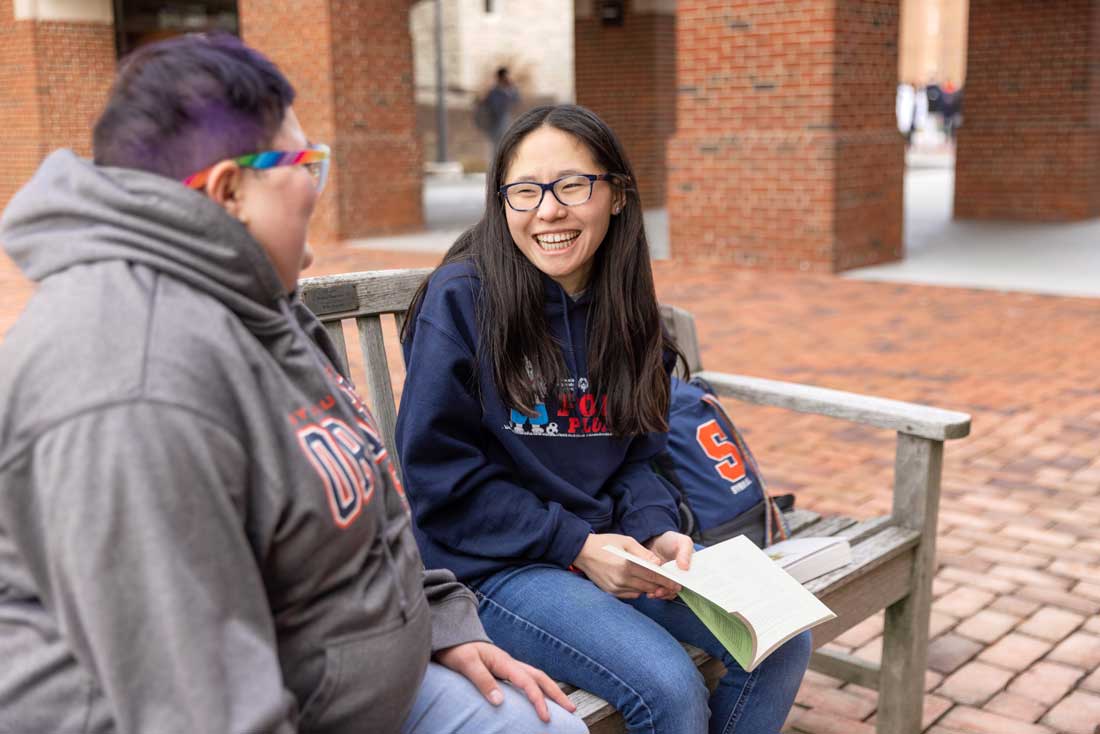
Embracing Self-Advocacy
One of Gleason’s most important efforts centers on advocacy, learning how to champion for her rights and others with disabilities. Last summer, she virtually attended the Autism Campus Inclusion Leadership Academy, a project of the Autistic Self Advocacy Network that is designed to help students learn how to improve their campuses for people with disabilities. “It was awesome,” she says. “I help all my friends and like to help them be organized.”
Last semester, as part of her coursework, Gleason participated in InclusiveU’s Advocacy in Inclusive Higher Education, a seminar that introduces students to advocacy work focusing on making inclusive higher education more accessible for those interested in attending college and enhancing inclusivity for current students. As part of the seminar, she joined classmates in working on a letter to the Student Association, which was seeking suggestions for creating change on campus. She also attended the Taishoff Center’s State of the Art Student Leadership Conference, which brought students from programs across the country together to connect, learn how to successfully transition to college and serve as advocates. The conference featured presentations on academics, health, internships and employment, relationships and social life. In a video from the conference, Gleason offers this advice to future students: “Get to know everybody and your way around campus,” she says.
Gleason is familiar with campus now and looks forward to the days she’s on the Hill, so she can explore and also meet friends for lunch. For the spring semester, she has volunteered to serve on the board of the new Disability Student Union and is taking Introduction to Jewelry and Metals, Beginning Yoga and Drawing I Observation.
Away from school, Gleason describes herself as a “boarder”—adept at skateboards, longboards, hoverboards and especially snowboards, which she’s hit the slopes with at local ski resorts as well as ones in Vermont. One day, Gleason hopes to run her own restaurant. As she continues her work and education, she’s inspired to make new connections and learn more about the culinary world and its endless offerings.
~ An SU Story by Jay Cox originally published on March 1, 2023.
Joan Christy Lecture Series Presents Chef Educator Danny Corsun
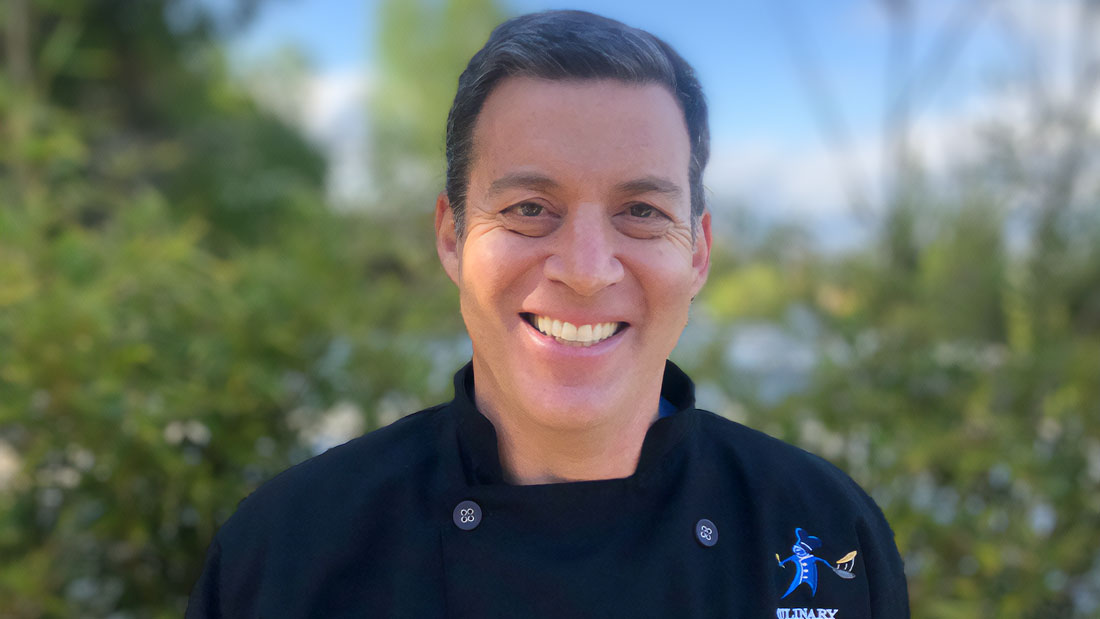
The Department of Nutrition and Food Studies will host chef educator Danny Corsun for “Edible empowerment: Using food as an experiential teaching vehicle” on Monday, March 6, from 3:30 to 5:00 p.m. in 335 White Hall, Falk College. View the event page for more details.
Danny Corsun has been a chef educator since 2000. As a classroom educator, he created a program that taught academic disciplines through experientially engaging cooking classes. This program created a fun classroom environment for students—and resulted in better cognitive processing and retention of curriculum. In 2005, he retired from that one classroom to teach in thousands.
Corsun created Culinary Kids Academy to provide math, science, history, and nutrition curriculum to youth across Los Angeles. In 2009 he expanded the company by adding a faith-based division. Culinary Judaics Academy uses both in-person programming and its “Masterclass for Jewish learning through cooking” digital platform to deliver dynamic, engaging, and experiential content and curriculum to Jews of all ages, affiliations, and levels of practice. Since 2005, Culinary Judaics Academy’s workshops have reached over 50,000 students worldwide.
The Joan Christy lecture series is made possible by The Christy Food and Culture Fund, established in 2005 through the generosity of Syracuse University nutrition alumna Joan Christy ’78, G’81 to provide support for a lecture series in the nutrition program at the University.
The event is free and open to the public. For accommodations requests, please contact Annette Hodgens at 315.443.9816 or ahodgens@syr.edu. For parking accommodations, please contact Mackenzie Kelly at 315-443-5573 or mkelly47@syr.edu.
Achieving Immortality
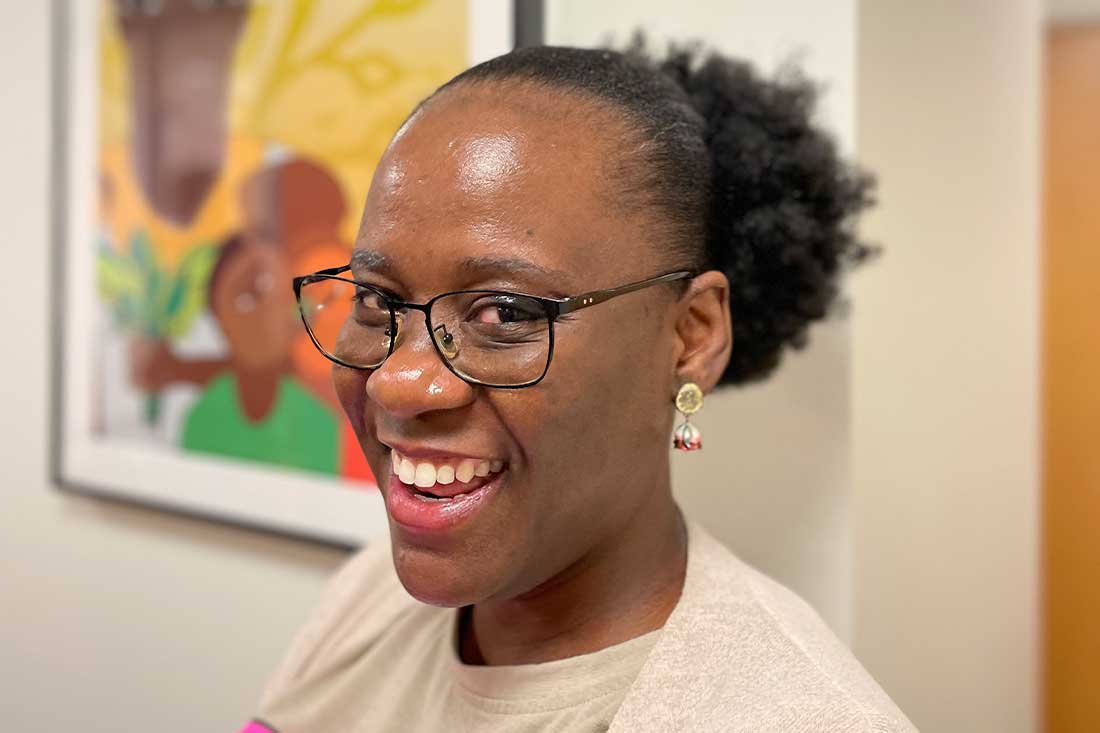
With the trees firmly in the ground, Vilanculo said that now she “just had to have children and write a book to achieve immortality.” Bellows looked at Vilanculo quizzically and asked what she meant.
“I explained to her that in my country (Mozambique), there is a saying that, when translated from Portuguese to English, goes: For someone to be immortal, they have to write a book, have a child, and plant a tree,” Vilanculo says. “And since we had a day planting trees, I just had two more things to do to be immortal.”
Bellows remembered that conversation when the Syracuse Urban Food Forest Project wanted to invite the residents of Syracuse’s South Side to a meeting in early February to discuss the kind of edible trees, shrubs, and herbs that could be planted in their neighborhoods this year, and where they should be planted.
To create that invitation, Bellows thought it would be effective if Vilanculo, with her unique perspective, authored a story about creating food forests in a community. To reach their desired audience, Bellows connected with Newhouse School of Public Communications Assistant Professor Greg Munno, who’s the Newhouse faculty representative on the board of directors for The Stand, a publication dedicated to community news from Syracuse’s South Side.
Munno, who spent 13 years as a reporter and editor at the Syracuse Post-Standard and syracuse.com before coming to Syracuse University, recognized the value of Vilanculo’s perspective and using her story as an invitation to the meeting. He graciously agreed to use Vilanculo’s story as a guest column, and here’s how it starts:
“There is a saying in Portuguese that goes, “para ser imortal, plante uma árvore, escreva um livro e tenha um filho,” which can be translated as “to be immortal, plant a tree, write a book and have a child.” That way your deeds will be a mark to be shown to several generations ahead of you.
“This saying, “para ser immortal,” is not about planting trees, writing books, or having children. Instead, in my Mozambican tradition, it is about the freedom to access spaces that are rightfully yours, owning one’s history, and having a community to call yours without any restraints. It may seem too pretentious to compare immortality to books, plants, and children. However, the Mozambican-derived analogy reiterates the importance of acts that reproduce autonomy and self-determination in construing the world around us.” …
The full story is available on The Stand’s website.

About Arcènia Notilija Vilanculo
Arcènia Notilija Vilanculo is an agronomic engineer from Mozambique with practical experience in the end-to-end project management of nutrition-sensitive interventions: sustainable agriculture, women empowerment, capacity building, and social behavior change strategies development. A 2022 Fulbright Scholar, she is interested in making a positive impact on the community and human development through food justice and inclusive food systems.
In pursuing her passion for working with communities on food systems, Vilanculo has been involved with the Syracuse Urban Food Forest Project since September 2022, supporting the implementation of food forests and research.
About The Stand
To learn more about The Stand, the South Side’s community newspaper, visit its website, Facebook page or Instagram page. If you’d like to get involved with The Stand, email Munno at gjmunno@syr.edu.
About the Syracuse Urban Food Forest Project
SUFFP is a collaborative project between Syracuse University and SUNY College of Environmental Science and Forestry. The project started in 2019 with Syracuse University SOURCE and U.S. Forest Service McIntire-Stennis funding. It continues with U.S. Forest Service Great Lakes Restoration Initiative support. Learn more about SUFFP through its Facebook and Instagram page, and in this story and video from Syracuse University.
Starting With a Seed
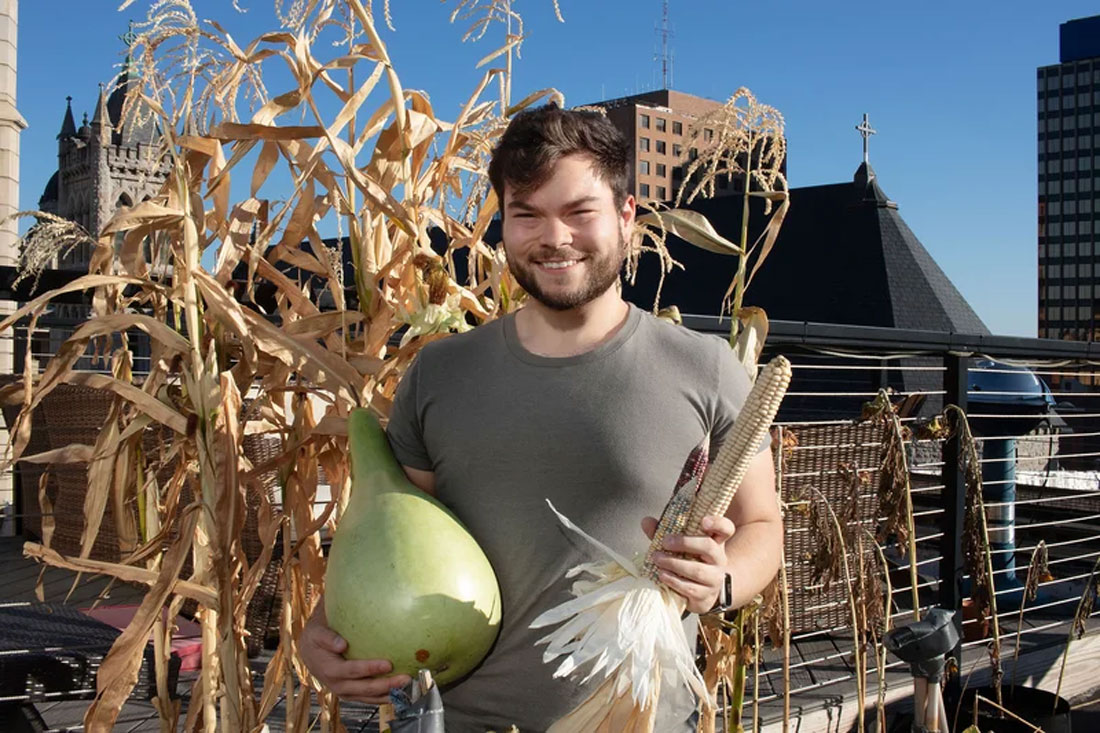
As a Syracuse University sophomore in 2015, Ethan Tyo ’17, G’23 was studying abroad in London when he decided to experiment with a plant-based diet. It was the beginning of a journey for Tyo, who went on to lose over 100 pounds in a year and a half and discover a passion for food. “It was about mental health, physical health, and becoming a new person,” recalls Tyo of his semester abroad.
Today, Tyo, a member of the Akwesasne Mohawk Tribe, is a food studies graduate student in the Falk College of Sport and Human Dynamics, where he’s combining his passion for food with an enthusiasm to educate others about his roots. From introducing a new garden on campus to becoming a published author, Tyo has utilized campus resources to create a more comfortable environment for the Indigenous community.
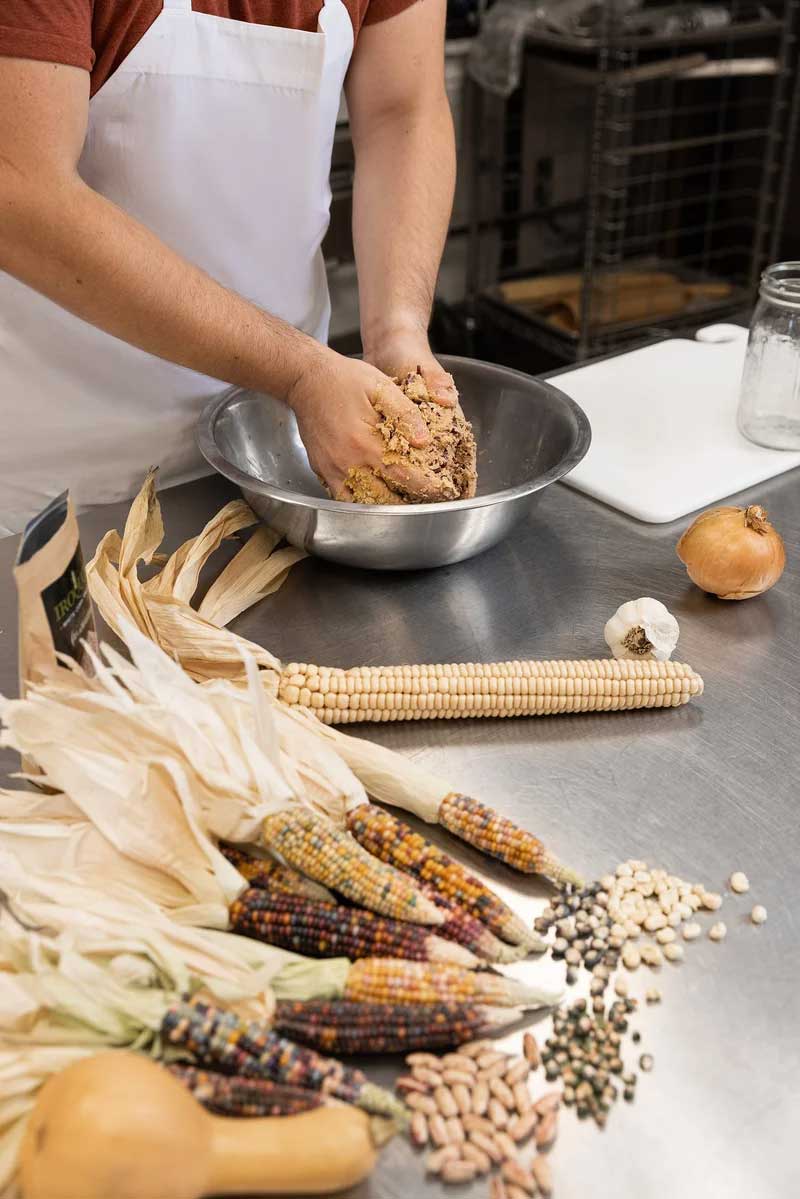
Growing up on Akwesasne Territory, which straddles the border between the United States and Canada in northern New York, Tyo didn’t have the resources to maintain a healthy diet. He explains that the nearest grocery store was a 25-minute drive from his home. When Tyo arrived at Syracuse University, suddenly fresh fruits and vegetables were readily accessible
Since then, Tyo has made it his mission to intersect his Indigenous roots with healthy dietary habits. For example, on South Campus, he planted a Three Sisters garden, which involves the Indigenous agricultural method of planting squash, beans and corn together to create a sustainable diet. In addition to Syracuse, he has initiated Three Sisters gardens at other nearby universities to help unite the Indigenous student communities and create opportunities for an underrepresented demographic on college campuses. Tyo’s influence has also earned national attention, as evidenced by his recipe for Three Sisters bean patties recently featured in The New York Times Cooking section.
It’s a fundamental goal of Tyo’s to incorporate Indigenous knowledge into campus life. “The purpose of the Three Sisters garden on campus was to create space for engaging with Indigenous activities while away from our home communities,” he says. “It’s a true land acknowledgment, and the first time Onondaga seeds have been returned to ancestral lands in this way. I believe this is a pathway to begin building relationships between Tribal communities and academic institutions whose ancestral land they inhabit today.”
While creating a more inclusive environment on campus, Tyo built a working relationship with Akwesasne leaders back on his home reservation. Tyo says he didn’t grow up very connected with his Indigenous peers, but he’s become closer with them since coming to Syracuse. He was unaware that many of the friends he made in college had grown up down the street from him.
From One Chapter to the Next
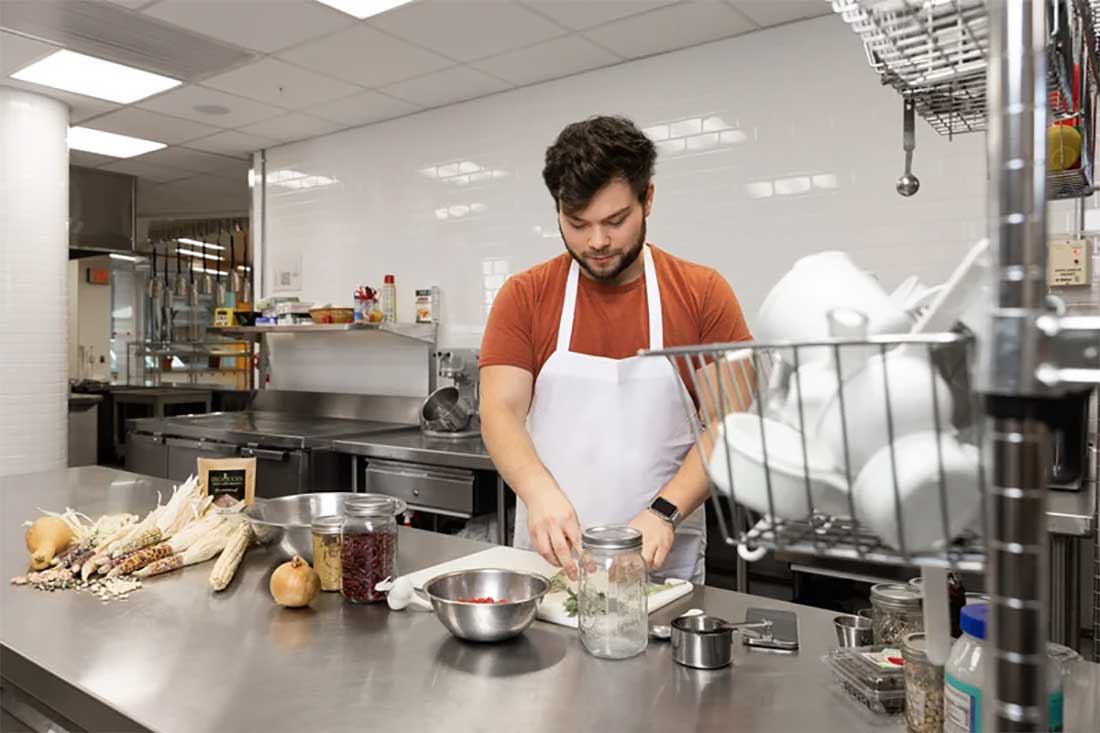
As an undergraduate, Tyo—who majored in information management and technology in the School of Information Studies—placed his focus on social media, personally and professionally. He documented his plant-based journey on Instagram and held internships working as a content strategist. “I learned how to be healthy, take care of myself and to balance lifestyle and nutrition,” he says. “How can I then document this, showcase it and learn from other people?” The answer began with social media. “A lot of my projects are like chapters, so social media was the first chapter of being able to change my lifestyle,” he says.
As one chapter closed, another opened. Returning to Syracuse to pursue a master’s degree in food studies, Tyo went back to doing what he does best: experimenting.
In his downtown apartment, Tyo pondered a question. “Is there a way we can grow food in food deserts, in urban areas, in weird spots like six stories in the air?” Without any knowledge of gardening, but with a handful of seeds, he attempted a rooftop garden. And in a recurring theme, it became a successful community garden where other residents could pick herbs, tomatoes and more. He also grew the Three Sisters there, trying out different seeds—keeping some for his collection and sending the extras back to his nation.
Last year, in a collaborative effort alongside friends and fellow graduate students, Tyo published the cookbook Fetagetaboutit, which weaves simple, plant-based recipes into a fictional story about Bobby Slay, a celebrity chef by day and superstar Master DJ by night. He wanted to create a nonconformist cookbook that could attract a younger audience while teaching the importance of sustainability and reducing food waste. “I wanted to compact down everything that I’ve been able to learn, live off and eat over the course of my plant-based journey up to then in my cookbook,” says Tyo, who curated most of the recipes.
Tyo produced the cookbook with guidance from the Blackstone LaunchPad—Syracuse University’s innovation community. Now, he’s a mentor with the LaunchPad, and he’s working with the creative community on another initiative, the AlterNative Project, which evolved out of his graduate practicum.
Spreading Seeds of Indigenous Knowledge
The AlterNative Project is an effort to engage people in experiences across the food system that are grounded in the Indigenous values of community, sustainability and land. “Indigenous food holds complex historic, cultural and theoretical value beyond books and stories. We need to understand this knowledge, so we can continue our ways,” Tyo says. “This project puts knowledge into action to educate and empower our communities.” For example, part of the reason he didn’t have a healthy diet growing up was the consequences of industrialism, he explains. PCBs, mercury and other harmful chemicals flooded the rivers feeding into Tyo’s reservation, leading to “poisoned land” and making it unsafe to naturally grow food there, he says.
The U.S. Environmental Protection Agency (EPA) established several Superfund sites for the St. Lawrence River area, which includes the Akwesasne Territory. The objective includes the “remediation of hazardous waste sites and contaminated sediments, and source control activities,” according to the EPA. Since 1987, there has been an ongoing effort to improve water quality in and around the St. Lawrence River area, but the restoration process is far from over. “We’re not able to fish in our rivers because of industrial plants,” Tyo says. “We had four or five industrial plants that were built upstream from us.”
The purpose of the Three Sisters garden on campus was to create space for engaging with Indigenous activities while away from our home communities. It’s a true land acknowledgment, and the first time Onondaga seeds have been returned to ancestral lands in this way.
The AlterNative Project seeks to shed light on such issues through educational efforts. For instance, Tyo worked with the Native Student Program to create a series of workshops and events around traditional Haudenosaunee foodways, including the Three Sisters garden dedication. This work has led to collaborations with academic departments at Syracuse to infuse Indigenous knowledge into curricula as well as establishing cultural sites at neighboring universities and partnering with museums. “Museums can protect and preserve traditional knowledge for future generations—with the long-term goal of developing tribal food system projects and opportunities to build resilience and food sovereignty back home,” he says.
It’s one of the many goals for Tyo in this very busy chapter of his life. Alongside Angela Ferguson, a member of the Onondaga Nation and a legend in the realm of Indigenous preservation, he will be working with the Adirondack Experience Museum on a cultural installation. Tyo will also head to the Museum of Natural History in New York City with Ferguson in the spring to demonstrate the revitalization of Indigenous agricultural and dietary methods through the Three Sisters gardens.
Several years ago, Tyo made the snap decision to change his relationship with food. Little did he know it was the first chapter in a story that is far from over. He is just scratching the surface of his long-term mission to fuse his knowledge of food with his Indigenous heritage to create awareness and a sense of community.
“Who knows what the potential is for these gardens?” Tyo says, gazing at a corn stalk rising a couple of inches above his head. “I’ve made my roots here.”
Cameron McKeon
Original story was published on January 24, 2023.
Page 3 of 18
